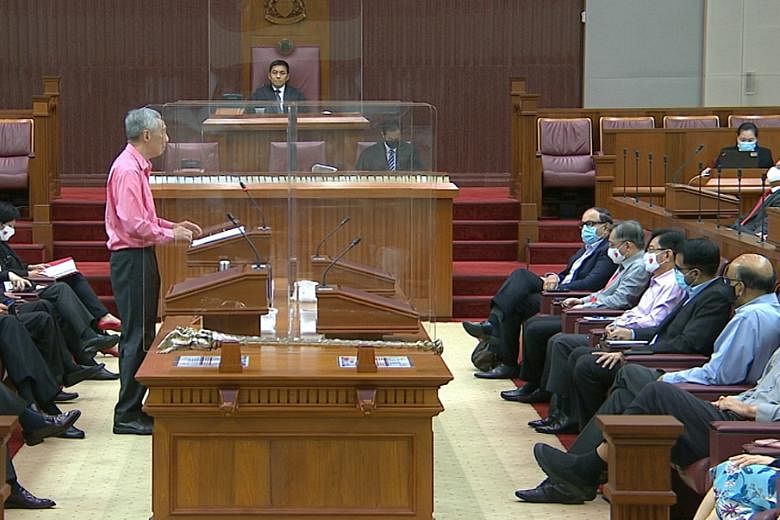SINGAPORE - The issue of Singapore's national reserves sparked a back-and forth between Prime Minister Lee Hsien Loong and Leader of the Opposition Pritam Singh on Wednesday (Sept 2).
Mr Singh, replying to PM Lee's criticism, said that when the Workers' Party raised the issue, its intent was not to raid the national coffers that have been built up over the years by past generations.
Rather, its intention was to examine the extent to which the growth rate of the reserves can be slowed to help fund social needs, without touching the principal amount, he said.
He also explained the backdrop against which some of the WP's proposals were made.
"Healthcare, ageing, the same Singaporeans who toiled hard now are in their retirement years (and) have some difficulties.
"Questions of intergenerational equity come up. And that's the context through which some of these proposals are put forward," Mr Singh said.
PM Lee, during the debate on the President's Address, had criticised how the opposition - namely, the WP - had asked for the size of Singapore's reserves.
It had previously also withheld support for an increase in the goods and services tax (GST) from 7 per cent to 9 per cent, citing a lack of clarity on projected expenditure and alternative revenue sources.
Said Mr Lee: "(They are saying), show me how much we have in our reserves before I decide whether to support your Budget and tax plans...
"Basically, they are asking: I have something in the bank already. How much of it can I touch?" This attitude is "fundamentally the wrong approach", he added.
Mr Singh said there is "nothing unusual" about the WP's proposal to slow the growth rate of the reserves but leave the principal sum untouched.
In fact, the ruling party's MPs had also supported such a move in 2016, when they, along with WP MPs, agreed to add revenue contributions from Temasek Holdings to the Net Investment Returns Contribution (NIRC) framework, he added.
Under the NIRC framework, the Government can spend half of the long-term investment returns generated by the Monetary Authority of Singapore, Temasek and GIC - the three entities tasked to invest the reserves.
Mr Singh said: "Does that not reduce the growth of the reserves? It does. So the argument cannot be that when the opposition tries to put that proposal forward, somehow we are engaging in some sort of chicanery to steal what previous generations have toiled to bring us here."
He added that Deputy Prime Minister Heng Swee Keat had said the size of the reserves is a matter of national security and cannot be disclosed.
But Mr Singh argued that Parliament provides an opportunity for such figures to be given - if not at a sitting, then in committee. Mechanisms are in place, such as the Official Secrets Act and rules on parliamentary privilege, to prevent an MP from divulging the numbers to others, he added.
The WP is asking about these figures "precisely because we're looking for alternatives to better consider the welfare of Singaporeans", Mr Singh said.
Responding, PM Lee said he was not arguing on the "technicalities of percentages, drawdowns, NIRC, and so on". Rather, he was arguing on a basic principle that reserves should be seen as a rainy day fund.
In coming up with the NIRC framework, PM Lee acknowledged that it allows the Government to draw from the reserves to fund a certain amount of expenses.
MPs debated and agreed on a rule which they felt was "a fair distribution between our present and future generations". That rule should not be revisited as soon as money is required, he added.
Also, the reserves could dip for various reasons, such as when the market drops and reduces the value of investments despite Singapore's best management of GIC or Temasek, as has happened from time to time, and when Singapore needs to draw down on the reserves, as it did this year to cope with the pandemic, he said.
Mr Lee said: "There is a balance of risk which we have to accept. And then there is a fundamental mindset: What are you depending on for the future? What is for now?
"I suggest that our mindset should be: What I have planned for the future I think of as only touching them in extremis."


